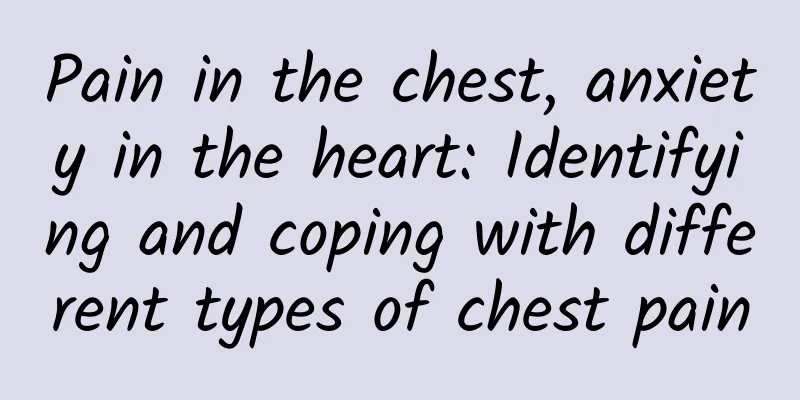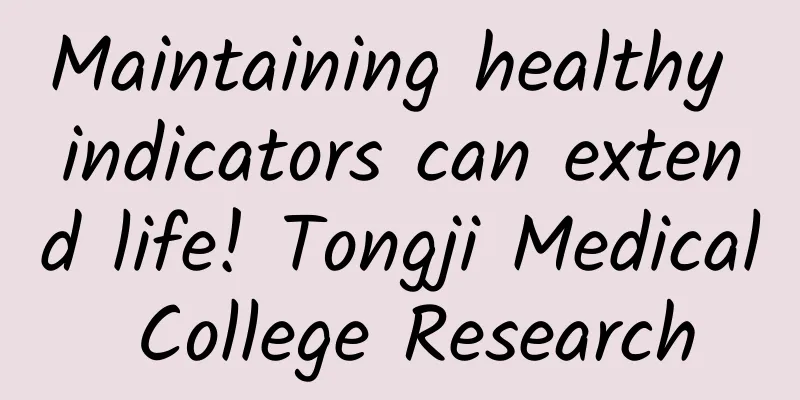Pain in the chest, anxiety in the heart: Identifying and coping with different types of chest pain

|
Author: Jiang Guanchao, Chief Physician, Peking University People's Hospital Reviewer: Zhi Xiuyi, Chief Physician, Xuanwu Hospital, Capital Medical University Chest pain is one of the most common complaints in thoracic surgery and cardiovascular medicine. Its clinical manifestations are diverse and its etiology is complex. Understanding the different types and characteristics of chest pain is of great significance for early diagnosis and early treatment. Chest pain is particularly closely related to the heart, and it is a common symptom of cardiovascular disease. Taking coronary heart disease as an example, the disease is divided into stable angina and coronary artery syndrome, the latter of which includes acute ST-segment elevation myocardial infarction, non-ST-segment elevation myocardial infarction and unstable angina. Stable angina pectoris usually presents as squeezing, tightening or cutting pain behind the sternum, which can radiate to the neck, pharynx, shoulders and back. It usually lasts no longer than 10 minutes and can be relieved by taking nitroglycerin. This type of pain is often triggered by activities or emotional excitement, and can be relieved by rest or emotional stabilization. Figure 1 Original copyright image, no permission to reprint However, when the coronary artery obstruction is severe or lasts for a long time, it may develop into unstable angina or myocardial infarction, in which the pain is more severe and lasts longer, accompanied by sweating, nausea, vomiting and other symptoms, and the response to nitroglycerin is weakened or ineffective. At this time, you need to see a doctor immediately, conduct auxiliary examinations such as electrocardiogram and myocardial enzyme testing, and perform coronary angiography and interventional treatment if necessary. In addition, chest pain after exertion should also be taken seriously. Chest tightness and pain after exertion, which are relieved after rest, are often manifestations of stable angina pectoris. This pain is typically radiative and lasts for a short time, generally not exceeding 10 minutes. If the pain lasts for a long time or does not ease after rest, and is accompanied by symptoms such as nausea and vomiting, you need to be alert to the occurrence of myocardial infarction and seek medical attention in time. For patients who experience chest pain after exertion, it is recommended to seek medical attention in a timely manner and undergo a comprehensive heart examination, including electrocardiogram, cardiac ultrasound, coronary CT, etc., to make a clear diagnosis and formulate an appropriate treatment plan. At the same time, patients should also pay attention to controlling risk factors such as blood pressure and blood lipids, improving their lifestyle, and preventing further development of the disease. Chest pain may also be accompanied by other symptoms, which are important for diagnosis. For example, if a patient with hypertension suddenly experiences tearing pain in the front and back of the chest accompanied by profuse sweating, it may be a manifestation of arterial dissection. Arterial dissection is an extremely dangerous disease and requires immediate medical attention for emergency treatment. In addition, chest pain accompanied by acid regurgitation may be a symptom of reflux esophagitis. Reflux esophagitis is an inflammatory disease caused by the reflux of gastric acid into the lower esophagus. Patients often experience symptoms such as a burning sensation behind the sternum and acid regurgitation. For such patients, gastroscopy and esophageal acid and manometry are recommended to confirm the diagnosis and formulate appropriate treatment plans. Figure 2 Original copyright image, no permission to reprint If chest pain is accompanied by dysphagia or pulling pain, you should be alert to the possibility of malignant diseases such as esophageal cancer. The early symptoms of esophageal cancer are not obvious, but as the disease progresses, symptoms such as progressive dysphagia may gradually appear. For such patients, it is recommended to perform barium meal radiography and gastroscopy to confirm the diagnosis and early treatment. When chest pain occurs, patients should seek medical attention immediately. When seeking medical attention, patients should describe the symptoms, duration, triggering factors, and relief methods of chest pain in as much detail as possible to help doctors make preliminary judgments. The doctor will make a preliminary diagnosis based on the patient's symptoms and signs, and arrange for appropriate auxiliary examinations to clarify the cause. For patients suspected of heart disease, electrocardiogram, myocardial enzyme test, coronary CT or coronary angiography can be performed; for patients suspected of esophageal disease, gastroscopy and esophageal acid and pressure measurement can be performed; for patients suspected of lung disease, chest CT and other examinations should be performed. During the medical treatment, patients should actively cooperate with the doctor's treatment plan, take medicine on time and have regular checkups. At the same time, they should also pay attention to maintaining good living habits and mentality, and avoid inducing factors such as excessive fatigue and mood swings. |
<<: Constant cough? Understand sputum changes and easily identify potential diseases
>>: How much do you know about the truth behind the disease hidden behind chest pain?
Recommend
How to determine menopause
With the increase of age, the ovaries go from uns...
Does ovulation necessarily occur 14 days before the next menstrual period?
The date of ovulation is not necessarily a fixed ...
Endometrial thickness 4mm is normal
The uterus is a reproductive organ unique to wome...
What are the side effects of cervical cryotherapy?
Cervical disease is a type of gynecological disea...
How to deal with pollen allergy in pregnant women
The spring season is undoubtedly a very troubling...
Treatment for back pain after cesarean section
Many women know that menstruation is very importa...
Causes of brown menstrual period
If irregular menstruation occurs, you will feel b...
What is the cause of the small tear in the vulva?
Small cracks on the vulva may be caused by inflam...
What fruits are good for the eyes? Why do my eyes swell after eyelash transplants?
Eyes are the face of each of us, and they accompa...
Early pregnancy stomach pain like menstruation coming soon
We all know that women will not have menstruation...
How long does it take for food eaten during breastfeeding to turn into milk?
Women should try to supplement as much nutrition ...
What should I do if I have a cough after a cesarean section? Introducing scientific therapy!
For various reasons, more and more women choose c...
What is the normal size of an ovarian follicle?
Everyone knows that pregnancy is the process of t...
How to treat breast lump pain?
If you have a lump or pain in your breast and wan...









